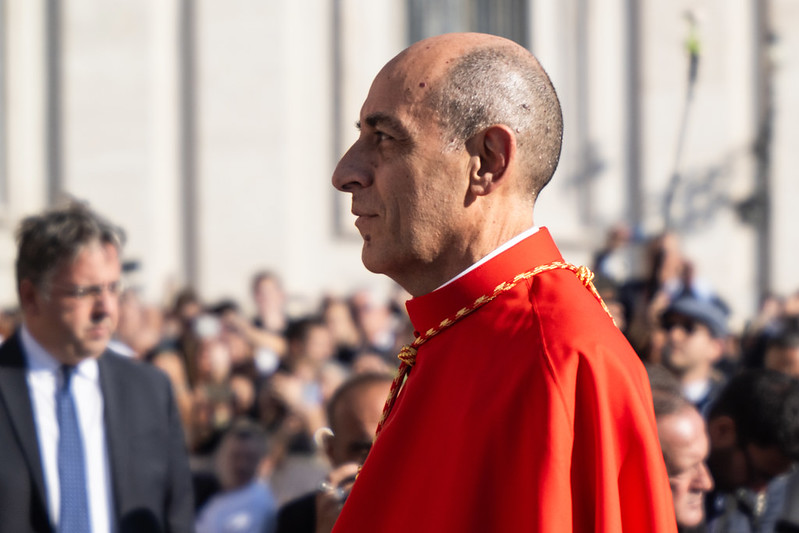Blessings for same-sex or “irregular” couples “must above all be very short”, according to a Vatican statement issued on 4 January.
The statement was issued by the Dicastery for the Doctrine of the Faith (DDF) “to help clarify the reception of Fiducia Supplicans”, the declaration “on the pastoral meaning of blessings” published on 18 December, which opened the possibility of pastoral blessings for couples in irregular relationships.
It asserts that the declaration is consistent with doctrine, while outlining the different ways it might be applied following a variety of responses around the world – including a number of bishops declaring that no such blessings would take place under their jurisdiction.
The DDF statement said that restricting the blessings was acceptable if “expressed with due respect for a text signed and approved by the supreme pontiff himself, while attempting in some way to accommodate the reflection contained in it”.
This reflection, it emphasises, is the recognition of a different form of blessing, “not the possibility of blessing couples in irregular situations”.
However, the statement denies that bishops can voice “doctrinal opposition” to Fiducia Supplicans, as it reiterates the Church’s teaching on marriage.
“Evidently, there is no room to distance ourselves doctrinally from this declaration or to consider it heretical, contrary to the Tradition of the Church or blasphemous.”
Bishops’ opposition to the declaration has generally focused on the difficulty of offering blessing without “causing scandal”, although the Cameroon bishops’ conference called its argument “hypocritical” while the response from the Archdiocese of Astana in Kazakhstan claimed the blessings would be “a most serious abuse of the Holy Name of God”.
The DDF statement distinguishes between responses dictated by bishops’ contexts, which “may require more or less time for [the blessings’] application”, and those who criticise the content of Fiducia Supplicans.
“It remains vital that these episcopal conferences do not support a doctrine different from that of the declaration signed by the Pope, given that it is perennial doctrine, but rather that they recommend the need for study and discernment so as to act with pastoral prudence in such a context.”
The document’s “real novelty”, the statement says, is the formulation of blessings outside liturgical contexts – an idea “that requires a generous effort of reception and from which no one should declare themselves excluded”.
“Although some bishops consider it prudent not to impart these blessings for the moment, we all need to grow equally in the conviction that: non-ritualised blessings are not a consecration of the person nor of the couple who receives them, they are not a justification of all their actions, and they are not an endorsement of the life that they lead.”
Describing the application of this teaching “in concrete terms”, the DDF statement emphasises the brevity of any blessing.
“These are blessings lasting a few seconds, without an approved ritual and without a book of blessings,” it says.
“If two people approach together to seek the blessing, one simply asks the Lord for peace, health and other good things for these two people who request it,” while also praying “that the Holy Spirit can free these two people from everything that does not correspond to his divine will”.
The statement offers an example of two divorced people in a new relationship, who approach a priest for a blessing in distress, and suggests a prayer for the situation:
“Lord, look at these children of yours, grant them health, work, peace and mutual help. Free them from everything that contradicts your Gospel and allow them to live according to your will. Amen.”
The statement also encouraged “a full and calm reading of the declaration”. Fiducia Supplicans itself says that “no further responses should be expected about possible ways to regulate details or practicalities regarding blessings of this type”.
Cardinal Victor Fernández, the prefect of the DDF, has made a series of public comments since the publication of Fiducia Supplicans, insisting that its teaching was clear to those who read it without “ideological” intent.
India’s most senior bishop, Cardinal Oswald Gracias of Mumbai, echoed Fernández in an interview last week, maintaining there was “no change at all in church doctrine…the Magisterium is very clear and there is no contradiction at all”.
He also followed the DDF prefect’s argument regarding contexts, saying that Fiducia Supplicans suited the “Indian mentality [which] is so inclusive, understanding people of other religions and other faiths”.
The Diocese of Hong Kong also issued a response saying that the declaration was consistent with Church tradition.
“The pastoral blessings to those who yearn for God’s mercy and long to entrust their lives into His hands are meant to help them to live fully accordingly to His will and to lead them to salvation,” it said. “This has always been the way that God leads mankind to salvation.”
The declaration was “not only rooted in biblical tradition and church teaching, but also highlights Pope Francis’ keen pastoral instincts”.
In contrast, the Hungarian bishops – while also asserting that the declaration did not affect doctrine – issued guidance on 27 December that priests “can bless all people individually” but “should always avoid giving a common blessing to those who live together in purely sexual relationships, in a non-ecclesially valid marriage or in a same-sex relationship”.
In the UK, few bishops have publicly responded to Fiducia Supplicans although Cardinal Vincent Nichols wrote to the priests of the Archdiocese of Westminster before Christmas with an explanatory note.
The Archbishop of Cardiff Mark O’Toole did issue a statement shortly after the declaration was published, welcoming “the desire and intention of the Holy Father to encourage and challenge us to be close to all people irrespective of their personal circumstances”.
“Such sensitive accompaniment clearly reflects the Lord's desire to be present to all people,” he said.
“I invite all in the Archdiocese of Cardiff and the Diocese of Menevia to read and reflect on Fiducia Supplicans carefully, so that they are aware of the parameters in which clergy may impart a blessing to others who seek it from them.”
In Scotland, the Bishop of Motherwell Joseph Toal also encouraged members of his diocese to read the declaration to “gain an appreciation of the rich teaching offered on blessings”.
In a New Year letter to his diocese, Bishop Toal welcomed “the possibilities it offers, and pray that it will assist the clergy in caring for those who seek our pastoral care and support”, observing that they are “very much in line with Pope Francis’ often repeated desire that the Church reaches out to all her children, particularly those who feel isolated or on the margins”.



 Loading ...
Loading ...